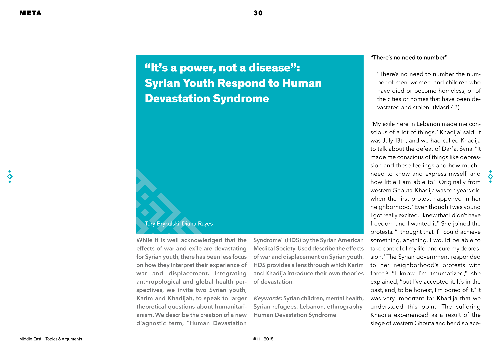"It's a power, not a disease": Syrian Youth Respond to Human Devastation Syndrome
While it is well acknowledged that the effects of war and exile are devastating for Syrian youth, there has been less focus on how they interpret their experience of war and displacement. Integrating anthropological and global health perspectives, we invite two Syrian youth, Karim and Khadijah, to s...
Furkejuvvon:
| Publikašuvnnas: | Middle East - Topics & Arguments |
|---|---|
| Váldodahkkit: | , |
| Materiálatiipa: | Artikel (Zeitschrift) |
| Giella: | eaŋgalasgiella |
| Almmustuhtton: |
Philipps-Universität Marburg
2018
|
| Fáttát: | |
| Liŋkkat: | Liŋkkat |
| Fáddágilkorat: |
Lasit fáddágilkoriid
Eai fáddágilkorat, Lasit vuosttaš fáddágilkora!
|
| Čoahkkáigeassu: | While it is well acknowledged that the effects of war and exile are devastating for Syrian youth, there has been less focus on how they interpret their experience of war and displacement. Integrating anthropological and global health perspectives, we invite two Syrian youth, Karim and Khadijah, to speak to larger theoretical questions about humanitarianism. We describe the creation of a new diagnostic term, “Human Devastation Syndrome” (HDS) by the Syrian American Medical Society. Used describe the effects of war and displacement on Syrian youth, HDS provides a lens through which Karim and Khadija introduce their own theories of devastation. |
|---|---|
| DOI: | 10.17192/meta.2018.11.7803 |
 Publikationsserver
Publikationsserver